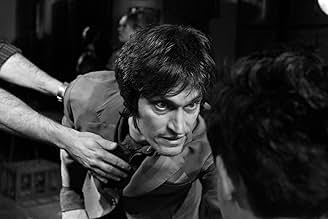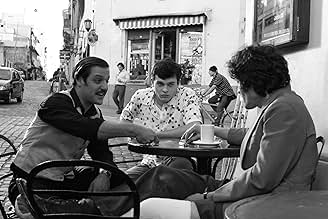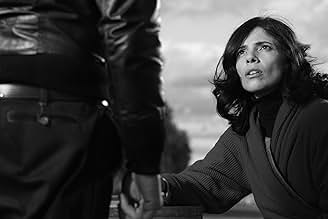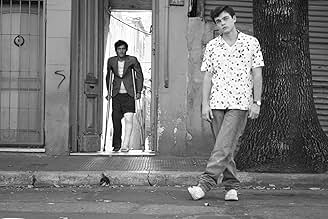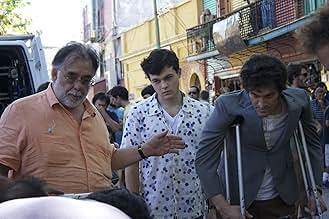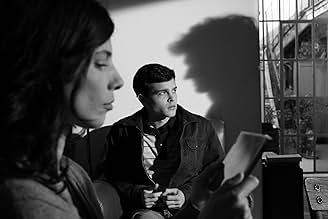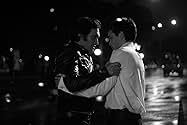Tetro
- 2009
- Tous publics
- 2h 7m
IMDb RATING
6.8/10
14K
YOUR RATING
Bennie travels to Buenos Aires to find his long-missing older brother, a once-promising writer who is now a remnant of his former self. Bennie's discovery of his brother's near-finished play... Read allBennie travels to Buenos Aires to find his long-missing older brother, a once-promising writer who is now a remnant of his former self. Bennie's discovery of his brother's near-finished play might hold the answer to understanding their shared past and renewing their bond.Bennie travels to Buenos Aires to find his long-missing older brother, a once-promising writer who is now a remnant of his former self. Bennie's discovery of his brother's near-finished play might hold the answer to understanding their shared past and renewing their bond.
- Director
- Writers
- Stars
- Awards
- 1 win & 6 nominations total
Rodrigo de la Serna
- José
- (as Rodrigo De La Serna)
Erica Rivas
- Ana
- (as Érica Rivas)
Sofía Gala Castiglione
- María Luisa
- (as Sofía Castiglione)
- Director
- Writers
- All cast & crew
- Production, box office & more at IMDbPro
Featured reviews
Enthralling, captivating. Buenos Aires, maybe? Black and White scope mostly, the limpid soul and devastating smile of Alden Ehrenreich. Coppola enjoys his freedom and so do we. At the base of it all, a juicy melodrama but the master flies over it with a tireless, youthful zest. Vincent Gallo seem a bit of an odd choice to play the title role and in fact I just found out that Matt Dillon was supposed to have played it. It certainly would have added up the romanticism and the sensuality that runs through it but, never mind. Alden Ehrenreich as Bennie is, quite simply, fantastic. Maribel Verdu another stand out as Tetro's loving if long suffering companion. Karl Maria Brandauer is horribly perfect, a character that emanates the kind of debauchery fame and rotten ego can provide. "There is room for just one genius in this family" I saw the film last night and it hasn't left me for a moment. I can't wait to see it again.
Tetro may be the "best" film Francis Ford Coppola has made in over 15 years. Whether this speaks more to the quality of his present state of direction as an artist or on the relative hits and misses of his career in the dregs of Hollywood (be it aiming high and just missing the mark with Godfather 3 and Dracula to stuff that went over people's heads like Youth Without Youth to even crap like Jack) is a combination. He's someone who attained financial success at a time, but then lost nearly all of it and along with it, arguably, some of his artistic merit. But after years of laying low and making wine, and making a whacked-out experiment that people either dug as an abstract piece or hated to hell ('Youth'), he comes out with Tetro like a porn star with a five-foot erection. He's got something to prove, if not to his audience then himself, and he proves it with a story that is personal and a film-making technique that recalls other masters but never too directly.
Tetro is about family, a subject Coppola is, of course, well-versed in being it the notorious kind (of course, the Godfather) and the more low-level and oddly intimate (Rumble Fish). It's a story, as with Rumble Fish, told in crisp black and white widescreen with flashes of color for flashbacks which may or may not be real, and as homage to operas like The Tales of Hoffmann. The title character, wonderfully and intensely portrayed by Vincent Gallo, is in a creative exile in Buenos Aires, a once promising writer living with his doctor-wife (Maribel Verdu, great as always) who is paid a visit one day by a young man, his brother Bennie (baby-faced newcomer Alden Ehrenreich) who hasn't seen him in years. There's secrets withheld by Tetro, not least of which about their parents, and soon an unfinished, longhand written play by Tetro (real name Angelo) is discovered by Bennie in a suitcase. He'll finish his brother's play, but at what cost?
The damaged, almost bi-polar writer, the insistent and impressionable brother, the strong but uncertain woman, these characters are fully realized by Coppola, and then on top of this comes a sort of terrific puzzle that is constructed through Tetro's unfinished play: what about their father, a famous composer (Klaus Maria Brandeur) who split them apart, possibly, or possibly not? What about their mother, who died in a car accident? What about the bond between Tetro and his former mentor, "Alone", the dubbed "most important critic in South America" who has created a pretentious empire around herself? Questions arise, and Coppola rises to the challenge of giving the audience answers but not spoon-fed. It's first and foremost a story of family, of brothers who love but have to find ways to contend with their damaged selves(inspiration being Rocco and His Brothers mayhap), and it's here that it's just about classic, on par with Rumble Fish if not even deeper and wiser about the effect of parents, or lack thereof, in lives spent and possibly wasted.
The writing is immensely interesting, always, even when Coppola may fall into over-indulging in his fantastic self-indulgence as an artist, such as with the operatic flourishes towards the end (this may not make sense, but compared to the WAY over indulgence of the hard-to-defend Y. W. Y it will). If anything the little imperfections, those brush strokes that go so high with the colors and shadows and impressionistic lighting that he and DP Mihai Malaimaire Jr engage in (one who hopefully will be getting more work following such spectacular work on a mix of 35mm and HD) along with Walter Murch's dependable editing, make it an even stronger work. It should feel a little messy here and there, because its subject matter is about finding a sense of purpose, in each other and in one's art. One feels Coppola working through a history of close but torn family ties, of losing loved ones (i.e. His own son), and at the same time a love of them all and of cinema peeking through in nearly every scene, even the ones where it doesn't look like much is going on.
Tetro is the antidote, basically, for this month's Transformers sequel. If you need to find the polar opposite of a picture based practically on just making money and reeling in the crowds with its dumb giant robot battles and preposterous and shallow theatrics, look no further than a picture which cares about its characters, its multi-faceted story and themes, and about projecting a technique that hearkens back to cinema of the 50s and 60s while sticking to an originality by its filmmaker. This will likely stay with me for a while, which is what Coppola's most profound works have done.
Tetro is about family, a subject Coppola is, of course, well-versed in being it the notorious kind (of course, the Godfather) and the more low-level and oddly intimate (Rumble Fish). It's a story, as with Rumble Fish, told in crisp black and white widescreen with flashes of color for flashbacks which may or may not be real, and as homage to operas like The Tales of Hoffmann. The title character, wonderfully and intensely portrayed by Vincent Gallo, is in a creative exile in Buenos Aires, a once promising writer living with his doctor-wife (Maribel Verdu, great as always) who is paid a visit one day by a young man, his brother Bennie (baby-faced newcomer Alden Ehrenreich) who hasn't seen him in years. There's secrets withheld by Tetro, not least of which about their parents, and soon an unfinished, longhand written play by Tetro (real name Angelo) is discovered by Bennie in a suitcase. He'll finish his brother's play, but at what cost?
The damaged, almost bi-polar writer, the insistent and impressionable brother, the strong but uncertain woman, these characters are fully realized by Coppola, and then on top of this comes a sort of terrific puzzle that is constructed through Tetro's unfinished play: what about their father, a famous composer (Klaus Maria Brandeur) who split them apart, possibly, or possibly not? What about their mother, who died in a car accident? What about the bond between Tetro and his former mentor, "Alone", the dubbed "most important critic in South America" who has created a pretentious empire around herself? Questions arise, and Coppola rises to the challenge of giving the audience answers but not spoon-fed. It's first and foremost a story of family, of brothers who love but have to find ways to contend with their damaged selves(inspiration being Rocco and His Brothers mayhap), and it's here that it's just about classic, on par with Rumble Fish if not even deeper and wiser about the effect of parents, or lack thereof, in lives spent and possibly wasted.
The writing is immensely interesting, always, even when Coppola may fall into over-indulging in his fantastic self-indulgence as an artist, such as with the operatic flourishes towards the end (this may not make sense, but compared to the WAY over indulgence of the hard-to-defend Y. W. Y it will). If anything the little imperfections, those brush strokes that go so high with the colors and shadows and impressionistic lighting that he and DP Mihai Malaimaire Jr engage in (one who hopefully will be getting more work following such spectacular work on a mix of 35mm and HD) along with Walter Murch's dependable editing, make it an even stronger work. It should feel a little messy here and there, because its subject matter is about finding a sense of purpose, in each other and in one's art. One feels Coppola working through a history of close but torn family ties, of losing loved ones (i.e. His own son), and at the same time a love of them all and of cinema peeking through in nearly every scene, even the ones where it doesn't look like much is going on.
Tetro is the antidote, basically, for this month's Transformers sequel. If you need to find the polar opposite of a picture based practically on just making money and reeling in the crowds with its dumb giant robot battles and preposterous and shallow theatrics, look no further than a picture which cares about its characters, its multi-faceted story and themes, and about projecting a technique that hearkens back to cinema of the 50s and 60s while sticking to an originality by its filmmaker. This will likely stay with me for a while, which is what Coppola's most profound works have done.
Thousand of miles away from Hollywood, the great Francis Coppola confronts something personal as a human being as well as a filmmaker. The story a young man looking for his older brother under the crippling shadow of a famous father. Hummm. Compelling, absorbing, mesmerizing at times. The younger brother is played with real magic by newcomer Alden Ehrenreich but for some inexplicable reason the older brother and title role is played by Vincent Gallo. He's an interesting guy but not at all the pivot that, clearly, the part required. I needed to feel things that Gallo didn't provide. He's just weird and even in the enormous emotional scenes (like the final one) he's not really there. I wonder why Coppola made this bizarre casting decision. The rest of the cast is fabulous and Buenos Aires breaths a life of its own even if, it didn't feel like Buenos Aires - I know that city pretty well - it looked at times like a border town in Mexico. Buenos Aires has an old fashion, seductive kind of elegance nowhere to be found here. I'm sure there is reason for it and I hope to discover it in my next viewing because this is a film I know I'll see many, many times. Another thing to cheer about, a strange and haunting score (it reminded me of "Apartment Zero" in more ways than one) and a sensational black and white Cinemascope screen. To be seen!
The week of his 18th birthday , Bennie (Alden Ehrenreich fim debut) travels to Buenos Aires to find his long-missing older brother . As he seeks out his older brother, the washed-out and disturbed Tetro (George Gallo) , whom he hasn't seen in years. Tetro lives with Miranda, (Maribel Verdú) a happy and always glad woman . He's introducing him as a "friend," refusing Tetro to talk about their family and some thoughts of their nasty dad cast a shadow over both brothers . But every family has a secret and every family has a past . Along the way Bennie's discovery of his worn-out brother's near-finished play might hold the answer to understanding their shared past and renewing their bond .
This an unsettling and interesting film , an intense drama concerning what past has Tetro left behind , being full of emotion , touching scenes , good feeling , marvellous dances inspired by The Hoffman Tales , The Red shoes by Michael Powell/ Emeric Pressburger and a final twist . It is a simple , dramatic and intelligent portrait of two people , focused on brothership , and sibling rivalry which a dark secret will forever change the family's fate . This is an uplifting movie at times , too , not just a tear-jerker or horrific in showing two sibling's suffering , as they attempt to regain the dignity they lost after years spent without seeing . The picture is developed in slow-moving but is pretty well realized . The flick stands out for its melancholy and poignant multilevel exploration of alienation , past records and despair . The story has a certain melancholic style , a climate of transience and sadness that spread the dispute between the two protagonists brothers . Visually it transports one into a dark, grey , nightmarish world but enriched by some colorful images thanks to some flasblacks well photographed by Mihai Malaimare Jr. , these images were shot in colour , but treated to give a slightly faded texture. The screenplay by Coppola himself , acting, direction all come together to create this extraordinary viewing experience . George Gallo gives a nice acting as the burnt-out Tetro , once-promising writer who is now a remnant of his former self , and he is is hot and cold toward his brother . His sibling is finely played by Alden Ehrenreich at his film debut as Bennie, a waiter on a cruise ship who has a layover in Buenos Aires to meet again his brother and subsequently he finds pages of Tetro's unfinished novel, then he pushes both to know his own history and to become a part of his life . Support cast is pretty good with several Argentina/Spain actors such as Maribel Verdú , Carmen Maura , Rodrigo De la Serna , Silvia Pérez , Erica Rivas , Leticia Brédice and special mention for Klaus Maria Brandauer as father .
The motion picture was compellingly directed by Francis Ford Coppola , though far from his greatest successes . Coppola explained that this one was a very "personal" project , being the kind of film he set out to make as a young man, before he was sidetracked by fame , fortune and sucessful boxoffice. Coppola's film The Godfather (1972) became one of the highest-grossing movies in history and brought him an Oscar for writing the screenplay with Mario Puzo The film was a Best Picture Academy Award-winner, and also brought Coppola a Best Director Oscar nomination. Following his work on the screenplay for The Great Gastby (1974), Coppola's next film was The conversation (1974), which was honored with the Golden Palm Award at the Cannes Film Festival, and brought Coppola Best Picture and Best Original Screenplay Oscar nominations. Also released that year, The Godfather: II (1974) , rivaled the big hit of The Godfather (1972) , and won six Academy Awards, bringing Coppola Academy Awards as a producer, director and writer. Coppola then began work on his most important film, Apocalypse Now (1979), a Vietnam War epic that was inspired by Joseph Conrad . Released in 1979, the acclaimed film won a Golden Palm Award at the Cannes Film Festival, and two Oscars. With George Lucas, Coppola executive produced Kagemusha (1980), directed by Akira Kurosawa, and Mishima (1985), directed by Paul Schrader and based on the life and writings of Yukio Mishima . Coppola also executive produced such films as The Escape Artist (1982) , Hammett (1983) , The Black Stallion Returns (1983), Barfly (1987), The Wind (1992) , The secret garden (1993), among others .
This an unsettling and interesting film , an intense drama concerning what past has Tetro left behind , being full of emotion , touching scenes , good feeling , marvellous dances inspired by The Hoffman Tales , The Red shoes by Michael Powell/ Emeric Pressburger and a final twist . It is a simple , dramatic and intelligent portrait of two people , focused on brothership , and sibling rivalry which a dark secret will forever change the family's fate . This is an uplifting movie at times , too , not just a tear-jerker or horrific in showing two sibling's suffering , as they attempt to regain the dignity they lost after years spent without seeing . The picture is developed in slow-moving but is pretty well realized . The flick stands out for its melancholy and poignant multilevel exploration of alienation , past records and despair . The story has a certain melancholic style , a climate of transience and sadness that spread the dispute between the two protagonists brothers . Visually it transports one into a dark, grey , nightmarish world but enriched by some colorful images thanks to some flasblacks well photographed by Mihai Malaimare Jr. , these images were shot in colour , but treated to give a slightly faded texture. The screenplay by Coppola himself , acting, direction all come together to create this extraordinary viewing experience . George Gallo gives a nice acting as the burnt-out Tetro , once-promising writer who is now a remnant of his former self , and he is is hot and cold toward his brother . His sibling is finely played by Alden Ehrenreich at his film debut as Bennie, a waiter on a cruise ship who has a layover in Buenos Aires to meet again his brother and subsequently he finds pages of Tetro's unfinished novel, then he pushes both to know his own history and to become a part of his life . Support cast is pretty good with several Argentina/Spain actors such as Maribel Verdú , Carmen Maura , Rodrigo De la Serna , Silvia Pérez , Erica Rivas , Leticia Brédice and special mention for Klaus Maria Brandauer as father .
The motion picture was compellingly directed by Francis Ford Coppola , though far from his greatest successes . Coppola explained that this one was a very "personal" project , being the kind of film he set out to make as a young man, before he was sidetracked by fame , fortune and sucessful boxoffice. Coppola's film The Godfather (1972) became one of the highest-grossing movies in history and brought him an Oscar for writing the screenplay with Mario Puzo The film was a Best Picture Academy Award-winner, and also brought Coppola a Best Director Oscar nomination. Following his work on the screenplay for The Great Gastby (1974), Coppola's next film was The conversation (1974), which was honored with the Golden Palm Award at the Cannes Film Festival, and brought Coppola Best Picture and Best Original Screenplay Oscar nominations. Also released that year, The Godfather: II (1974) , rivaled the big hit of The Godfather (1972) , and won six Academy Awards, bringing Coppola Academy Awards as a producer, director and writer. Coppola then began work on his most important film, Apocalypse Now (1979), a Vietnam War epic that was inspired by Joseph Conrad . Released in 1979, the acclaimed film won a Golden Palm Award at the Cannes Film Festival, and two Oscars. With George Lucas, Coppola executive produced Kagemusha (1980), directed by Akira Kurosawa, and Mishima (1985), directed by Paul Schrader and based on the life and writings of Yukio Mishima . Coppola also executive produced such films as The Escape Artist (1982) , Hammett (1983) , The Black Stallion Returns (1983), Barfly (1987), The Wind (1992) , The secret garden (1993), among others .
Released in 2009 and directed by Francis Ford Coppola, "Tetro" is drama about two American brothers in Buenos Aires, Argintina. The younger one, Bennie (Alden Ehrenreich), idolizes the older, Tetro (Vincent Gallo), and hasn't seen him in a dozen years because he mysteriously cut all ties with the family and moved to Argentina, where he lives with his girlfriend, Miranda (Maribel Verdú). Bennie discovers his brother's near-finished play and is obsessed with completing it without his permission, perhaps because he senses it holds the answers he seeks. Klaus Maria Brandauer plays the arrogant conductor father while cutie Sofía Gala is on hand as a young Argentinan girl that fancies Bennie. The movie is primarily in B&W, but with color flashbacks.
"Tetro" is an artful and somewhat hypnotic adult-oriented drama by the master filmmaker, the very opposite of conventional Hollywood blockbusters. Ehrenreich is reminiscent of Leonardo DiCaprio when he was young while Gallo is broodingly charismatic as the eponymous protagonist. Coppola has always had a good eye for female cast and "Tetro" delivers the goods with Verdú and Gala, although I wish the latter had more screen time. There's a revelation at the end that I failed to anticipate, but should have because everything in the story points to it.
Francis said at the Cannes film festival that "nothing in (the movie) happened, but it's all true." In other words, the film's autobiographical in some ways. The challenge is to perceive the parallels. Two are obvious seeing as how Coppola's father was a famous conductor. The other is when South America's most honored critic asks Tetro if her opinion matters to him anymore and he honestly says it doesn't; sticking her nose in the air, she silently walks away. Like Tetro, Coppola no longer cares what critics think of his works. It's akin to Kurtz' disposition toward the pathetic brass in "Apocalypse Now." The critic's name in the film is fittingly "Alone," played by Carmen Maura. Then there's the fact that Francis has a brother he's been known to have a love/hate relationship with, not to mention how his nephew, Nicolas Cage, is a little reminiscent of the titular character. But none of this speculation really matters; all that matter is that "Tetro" is a creative, operatic, entertaining drama. But stay away if you need constant 'exciting' things going on, like explosions, absurd action scenes and the corresponding CGI (not that there's anything wrong with that, lol).
The film runs 127 minutes and was shot in Buenos Aires & the Andes, Argentina with studio work done in Spain.
GRADE: B
"Tetro" is an artful and somewhat hypnotic adult-oriented drama by the master filmmaker, the very opposite of conventional Hollywood blockbusters. Ehrenreich is reminiscent of Leonardo DiCaprio when he was young while Gallo is broodingly charismatic as the eponymous protagonist. Coppola has always had a good eye for female cast and "Tetro" delivers the goods with Verdú and Gala, although I wish the latter had more screen time. There's a revelation at the end that I failed to anticipate, but should have because everything in the story points to it.
Francis said at the Cannes film festival that "nothing in (the movie) happened, but it's all true." In other words, the film's autobiographical in some ways. The challenge is to perceive the parallels. Two are obvious seeing as how Coppola's father was a famous conductor. The other is when South America's most honored critic asks Tetro if her opinion matters to him anymore and he honestly says it doesn't; sticking her nose in the air, she silently walks away. Like Tetro, Coppola no longer cares what critics think of his works. It's akin to Kurtz' disposition toward the pathetic brass in "Apocalypse Now." The critic's name in the film is fittingly "Alone," played by Carmen Maura. Then there's the fact that Francis has a brother he's been known to have a love/hate relationship with, not to mention how his nephew, Nicolas Cage, is a little reminiscent of the titular character. But none of this speculation really matters; all that matter is that "Tetro" is a creative, operatic, entertaining drama. But stay away if you need constant 'exciting' things going on, like explosions, absurd action scenes and the corresponding CGI (not that there's anything wrong with that, lol).
The film runs 127 minutes and was shot in Buenos Aires & the Andes, Argentina with studio work done in Spain.
GRADE: B
Did you know
- TriviaFrancis Ford Coppola claimed that this is the kind of film he set out to make as a young man, before he was sidetracked by fame and fortune.
- GoofsEarly in the movie Tetro stumbles into the kitchen with a broken leg and knocks over some furniture while lighting a cigarette using a burner on the stove. he ignites the burner by just turning the knob on the stove. A few minutes later Miranda must use a match to light a burner on the same stove-top.
- ConnectionsFeatured in At the Movies: Cannes Film Festival 2009 (2009)
- SoundtracksEl Búho
(2007) (uncredited)
Written & Performed by Lisandro Aristimuño
Courtesy of Los Años Luz Discos SRL
- How long is Tetro?Powered by Alexa
Details
- Release date
- Countries of origin
- Languages
- Also known as
- Francis Ford Coppola's Tetro
- Filming locations
- Production companies
- See more company credits at IMDbPro
Box office
- Budget
- $5,000,000 (estimated)
- Gross US & Canada
- $518,522
- Opening weekend US & Canada
- $30,504
- Jun 14, 2009
- Gross worldwide
- $2,874,474
- Runtime2 hours 7 minutes
- Color
- Sound mix
- Aspect ratio
- 2.35 : 1
Contribute to this page
Suggest an edit or add missing content








